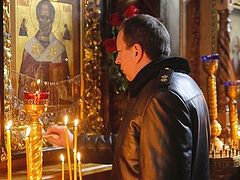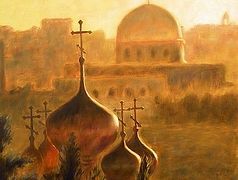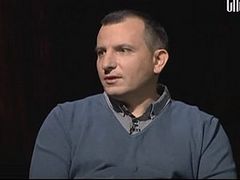This story took place in the 1990s in the Zaporozhye region of Ukraine. I am relating it just as I heard it. I will describe the missing details according to how they might have happened. The gist of the story is not in its details but in the incomprehensible Divine providence that brings people to God in wonderful ways.
Ivan Petrovich’s acquaintances nicknamed him “dachnik” [the owner of a summer cottage in the country.—Trans.]. No one (including Ivan Petrovich himself) imagined him without his dacha—a holiday home in the country.
He started making his dacha comfortable even before his retirement. He bought a plot of land of 700 square meters (c. 0.17 acres) in the country with a small old cottage, complete with a shed and a cellar. He had an inexpensive yet high-quality repair done at the dacha. He began to grow potatoes, tomatoes, strawberries, raspberries, onions and planted a few trees. He plastered up the cellar and cleared up the space above it. In time the cellar was filled with jars and cans because he was keen on making food preserves.
Ivan Petrovich enjoyed himself at his dacha both physically and mentally. When he still had a job, he would always go there for weekends to equip his “hacienda” (as he jokingly called his dacha) with all the necessary facilities. He would tell his acquaintances that he was preparing himself a little corner for his old age and indeed he dreamed of moving “closer to nature” with time.
When Ivan Petrovich retired, his family and friends did not see him in the city in the spring, summer and early fall anymore. The retiree spent all his time at his dacha. With the first spells of cold he would return to his warm city apartment, but he missed his country “estate” very much.
Once a week he did “escape” to his dacha despite his wife’s protests. He would kindle his stove, brew tea, sweep the yard, stroll in his kitchen-garden and look at the frozen river. Sometimes he would fish on the ice. In the evening he would get back home relaxed.
But that fateful winter his serene days were troubled.
A robber appeared in the holiday homes in the village. He visited virtually all the cottages in a few days. He would break the locks or windows and take all that was of any value: agricultural implements, potatoes from cellars and even preserves for winter.
Ivan Petrovich’s “hacienda” did not escape this fate. The burglar penetrated into the house through a window, stole an electric kettle and, unable to find anything else, entered the cellar. As a result several jars of jam, a bag of potatoes and a bottle of cherry liqueur went missing.
When Ivan Petrovich discovered the burglar’s tracks, the most distressing thing about it was not the loss of the kettle and food but the fact that another person had walked and played at being the owner there. As if his beloved dwelling had been desecrated and a sacrilegious act committed in the cherished corner that belonged to the retiree’s heart.
The criminal could return. There was a lot of food left in the cellar. Ivan Petrovich was pondering on what he should do.
Ivan Petrovich had a reputation of being a man of a practical frame of mind and a wizard with his hands. He combined his engineering education with a naturally keen mind. He used to be involved in construction and repair works in his life. He took a great interest in invention and in his youth took out a patent for several of his original inventions in the building sphere. In short, he was good at making all sorts of devices.
While Ivan Petrovich was thinking, the burglar came back to his dacha; though this time he did not enter the house—he was only interested in the cellar. He knocked the new lock out of the shed door with a hammer. As a result a third of the owner’s reserves were found to be missing.
Ivan Petrovich had to take measures urgently. Having considered several options, he decided to apply a mechanism that one of his acquaintances had once used. It was not tricky, but catching the burglar red-handed was guaranteed. Neither police, nor dogs, nor surveillance cameras were needed. The device alone would do the job.
Its operating principle was as follows. First the burglar would approach the shed with the entry to the cellar inside it. The shed doors were locked, but the criminal would deal with them easily. Then he would meet with other doors that led directly into the cellar. They were left open.
The intruder would then go underground, walking down the steps. There was an inconspicuous key on one step that would automatically close the cellar doors. The culprit would inevitably step on it, making the doors behind him slam. They would slam very quickly and could only be opened from outside. Thus the robber would find himself in a dark underground trap and stay there until the owner’s arrival.
It took two days to prepare the materials and another two days to install the mechanism. Ivan Petrovich had to spend one night at his dacha in the cold. He caught a chill there after not getting enough sleep and overstraining himself. So the retiree caught a bad cold and stayed in bed for the next three weeks.
He thought about his dacha and burglar all the time. What if the criminal had already been caught and ended up in an “underground pocket”? What if he got caught immediately after the trap’s installation? You can go mad after three weeks in a dark cellar. And you may die. Ivan Petrovich imagined how he would enter the cellar and see a twisted corpse and got terrified… Though he would say to himself immediately: “A thief deserves a thief’s fate.” After that he would calm down a little, but became agitated again.
He attempted to get up from bed and go to the dacha several times, but his vigilant wife Veronica Lvovna did not allow him to leave home until he had fully recovered.
At long last the day came when Ivan Petrovich reached his country cottage.
Our hero worked out the following plan: if his device worked and the criminal was caught, he would call the police and wait for their arrival. And what were they going to see in the cellar?--The retiree avoided thinking about this. Now he wanted to see the untouched doors of the shed most of all.
Trying to move noiselessly, Ivan Petrovich approached the shed with the cellar inside it. His heart was thumping and his temperature rose with agitation.
The shed doors turned out to be open. The torn-off lock lay near it. Ivan Petrovich gasped for air and his throat was parched. His legs grew numb. Though the retiree was ready for such developments, he got very worried. He came up to the entrance and looked deep into the shed. A sunbeam hit the solid surface of the closed doors.
There was no doubt that the trap had worked and the robbers were ensnared. It was difficult to say how long this had lasted. He put his ear to the door and strained. There was complete silence.
Though his hands disobeyed him, the man called the police. Then he stood by the cellar entrance a little and walked back home to wait for the police.
In the house he could do nothing but sit by the window and gaze at the broken shed doors. Though he had been through a lot in his life, he had never caught a thief. How many criminals were entrapped? How long had they been there? Were they still alive? What if they would resist the police violently? What if they would start shooting? What do the faces of such people look like?
The police arrived half an hour later. It was the culmination of the whole story. Ivan Petrovich opened the cellar doors, and the police officers stepped into the darkness, using pocket torches to light their way. Ivan Petrovich followed them. A few moments later they found themselves in the cellar. The sight that appeared before them was shocking.
The criminal was alone. He was sitting on a “couch” he had built with the planks that he had taken out of the shelves. There was bedding made of some dirty rags on his wooden “couch”. The burglar had wrapped himself in old onion and potato bags, trying to protect himself from cold. He was absolutely silent and motionless. The police pointed their flashlights towards him and silently scrutinized the bandit for a minute.
He had a thin, unshaven face and a steady, somewhat relaxed look. His hair was short and he had a high temple. The guy was in his early or mid-thirties.
He smelled pungent. And not only he. His “bed” was surrounded by jars and cans full of stinking fluid. The intruder had probably lived on the preserves, using the empty jars and cans as toilet. It was clear that he had been there for a long time, maybe for all three weeks.
The police handcuffed the guy and led him out. The bandit limped with difficulty. Ivan Petrovich observed the police put him into the police car. When the police left, Ivan Petrovich started to put things in his cellar in order.
After a time the burglar was tried and sentenced to three years. Ivan Petrovich did not hear anything else about him and did not care about what became of him. There were no more thefts in the village.
***
Ten years passed.
Is Ivan Petrovich still alive? Yes, he is, and has robust health despite his advanced age. And he even goes to his beloved dacha. But his faithful spouse Vironica Lvovna is now seriously ill. She has a cancer. She has had a course of chemotherapy and the results are unclear. The situation is very unstable. And in this uncertainty Veronica Lvovna decided to turn to Him to Whom all who find themselves in such life situations turn—to God. She began to pray and go to church. A priest advised her to go to a famous monastery nearby and pray there. Veronica Lvovna persuaded her husband to accompany her.
Ivan Petrovich did not argue with his sick wife, although he treated religion with distrust. Though he agreed to escort his spouse, he declined to go to confession with her because of lack of faith.
When Ivan Petrovich was sitting on a bench in the church porch waiting for Veronica Lvovna, a monk went past him. He scanned Ivan Petrovich, made several steps forward, stopped, turned around and suddenly walked towards him. His facial features seemed familiar to Ivan Petrovich.
“Good evening! Are you Ivan Petrovich?” the monk asked.
“Good evening! Yes, I am…”
“Do you recognize me?”
“I am sorry I don’t.”
“Surely you don’t, since so many years have passed. I am the burglar whom you caught in your cellar ten years ago. And I recognized you at once. Your face is fixed in my memory.”
Ivan Petrovich was thunderstruck and gazed wide-eyed at the monk. Yes, it was the burglar from his dacha! Now the retiree recognized him. The same look, the same thin face, though now he wore a beard. The old man was gazing at the monk with fear, while the latter was looking at him joyfully and with a smile. The monk sat down next to him.
“You see, I want to thank you.”
“Me? What for?”
“For your cellar and your trap. I thought a lot for those three weeks in the underground room. Your cellar changed me dramatically; I left it absolutely transformed and resolved to rearrange my life.”
Ivan Petrovich looked at the monk with interest. The latter proceeded:
“I remember being struck with horror, realizing that I was caught. I understood I could die of hunger in that awful cellar. At first I was developing a scheme according to which I would break away when the police captured me. Or I could pretend to be dead or pretend I was mortally ill and then escape. But next I had absolutely different thoughts. Suppose I escaped—but what next? The same thefts, the same tedious life? What was the purpose of such life? And what is the purpose of life in general?
“I was crying. Crying for myself, my ruined life, and my past. I was weeping because I came to sit in the damp, cramped cellar, eating someone else’s food from cans, and defecating into them. Weeping that I would probably die there.
“It was then that I invoked the name of God for the first time. And He heard me, answered and came to me. I sensed His presence very keenly. I began to pray to Him passionately and wholeheartedly. And He filled me—a criminal, a godless, miserable robber—with Himself. I felt warmth, joy and peace so keenly that I was not afraid of dying in that ‘dungeon’ anymore. I knew that if I were to die, I would die with Christ. And if I survived and ever got out of the underground room, I would always be with Him. That occurred so unexpectedly; I had never experienced anything like that in my life.
“And the Lord had mercy on me—I got out. The sense of God’s closeness did not leave me even during trial, in jail and at the monastery which I joined after serving my term. Afterwards I lost this sense of God’s presence repeatedly for certain reasons… But He never abandoned me. Now I am here and I never stop thanking the Almighty for your trap and cellar. Though it was not your trap—that trap was God’s.”
Ivan Petrovich was looking at him with amazement. He was sincerely astonished. It was the first time in his life Ivan Petrovich was involved in a story directly related to religion.
The monk proceeded with a smile:
“I used to pray a lot for you and your wife whom I had seen in the court. And the Lord ordained for me to meet you again, right at the monastery. Have you come here for confession and Communion?”
“Yes… No, not exactly so… My wife is seriously ill… I have brought her here to pray.”
“And what about yourself?”
“I… I don’t know… I am not so religious…”
“I see…”
“Yes…”
“Think about this, Ivan Petrovich. You see how the Lord brings us to Himself through such wonderful twists of fate! Perhaps your wife’s recovery now depends on you—your efforts in faith and prayer.”
Something trembled in Ivan Petrovich’s face.
“Father, pray for her.”
“I will certainly do. But in this case your prayer is stronger than mine. Because you are the closest to her. And you love her much more than I do—a perfect stranger to you.
“And prayer for someone else is a work of love. He who loves strongly has true prayer.”
Ivan Petrovich and the monk were silent for a minute. Then the monk rose.
“Good-bye, Ivan Petrovich. May the Lord help you. Come to our monastery again. You can even stay here for a week. I will do all in my power to help you.”
“Thank you.”
“Well, may God keep you.”
“May God be with you.”
The monk bowed to Ivan Petrovich and disappeared in the altar. Though he wore black vestments, for Ivan Petrovich the monk had an angelic appearance. The retiree followed him with his eyes. He suddenly recalled a burglar sitting on the planks and wrapped in bags… The old man smiled, and tears appeared in his eyes.
Soon Veronica Lvovna came out from the depths of the church:
“Vanya [a diminutive form of the name Ivan.—Trans.], we can go. I have been to confession. The Vigil will end soon.”
“Wait. I want… to go to confession, too.”
“You???”
“Yes.”
“Has anything happened?”
“You are right… God has sent me a message.”
Leaving his dumbfounded wife on the bench, Ivan Petrovich entered the dark depths of the church.”




